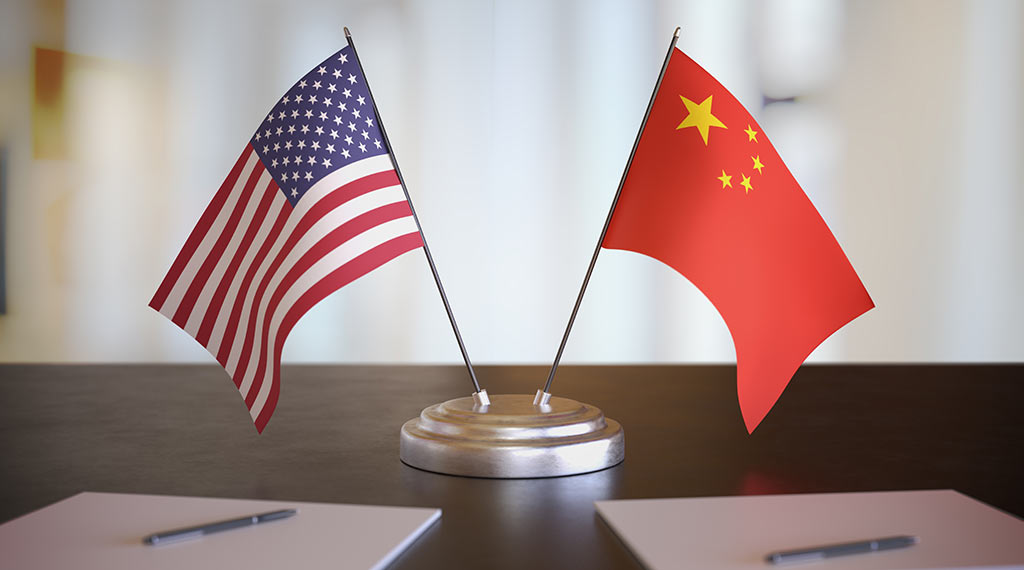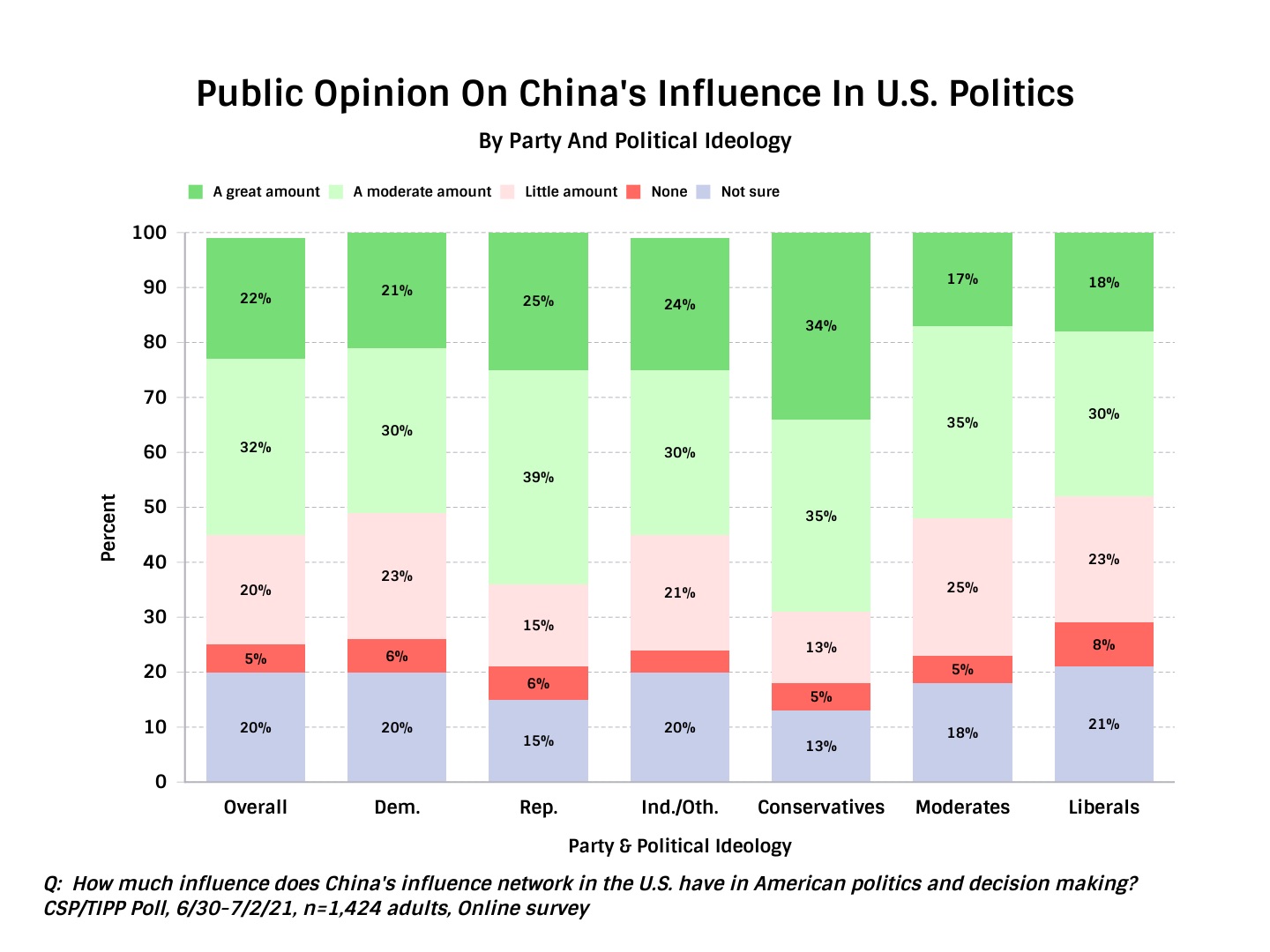More than half of Americans believe China influences American politics and decision-making
Editor’s note: The Center for Security Policy gratefully acknowledges its collaboration with tippinsights on the simultaneous and exclusive release of this important story.

More than half of Americans believe China’s influence network has “great” or “moderate” influence over American politics and decision-making, according to a new TIPP poll conducted for the Center for Security Policy.
Republicans were most likely to perceive great or moderate influence (64%) but a majority of both Democrats (51%) and Independents (54%) felt the same.

Income differences were also significant. The three income groups under $75k ranged from 47-58% seeing great/moderate influence while for $75k+ this number jumped to 69%. This may be because the business, entertainment and professional class are better placed to observe trade and other interactions with China. Likely related, 68% of investors saw significant influence vs. only 48% of non-investors. This tracks with the theory that Chinese influence is more tangible for globally engaged persons.
Numbers were nearly identical among racial groups.
Chinese influence is real and pervasive
The Chinese government is engaged in an ambitious and far-reaching mission to manipulate core institutions of the United States. From national, state, and local government, to universities, think tanks, media and corporations, the objective of this influence is to promote sympathetic views of China, especially its government, policies, and culture.
This month, the Biden administration accused the Chinese government of breaching Microsoft email systems which are used by governments, military contractors, and many of the world’s largest companies. The U.S. assembled a large coalition including the E.U. and all NATO members to condemn China, but they stopped short of sanctions or any tangible punishment as many of those countries enjoy lucrative trade deals with Beijing. In April, the White House imposed penalties on Russia for the SolarWinds software hacks, indicating a willingness to sanction countries with less influence in the West.
On July 21, House Democrats narrowly killed a bill that would have required the White House to declassify intelligence related to the origins of the COVID-19 virus after the proposal from Sen. Hawley of Missouri and Sen. Braun of Indiana passed unanimously in the Senate. This move has empowered Beijing in the face of the second phase of the World Health Organization’s (WHO) investigation into the origins of the virus. The first phase, hampered by lack of transparency on the part of the Chinese government, found that it was highly unlikely the virus originated in a Wuhan lab. Since then an array of experts have reconsidered, including a formerly skeptical Dr. Anthony Fauci who said he is “not convinced” COVID-19 came about naturally.
Top members of Congress have been briefed by intelligence officials that Chinese spies are trying to infiltrate their ranks, with Beijing especially seeking to identify and cultivate rising politicians. Rep. Eric Swalwell, a member of the House Intelligence Committee was approached by Chinese operative Fang Fang (Christine Fang) shortly before he got elected to congress in 2012 and she helped fundraise for his 2014 campaign. Swalwell allegedly had a sexual relationship with Fang, and even if she did not access classified information, she was potentially able to gain leverage via intimate knowledge of his affairs.
On American university campuses, Confucius Institutes provide the Chinese government access to U.S. student bodies, and Chinese Students and Scholars Associations report on Chinese nationals on American campuses and put pressure on universities that host events deemed politically offensive to China.
In 2012, Chinese media conglomerate Wanda Group, owned by a Chinese Communist Party member, bought a majority stake in American movie giant AMC Theatres, the largest theater chain in the world. While relinquishing majority status in March 2021 it still holds a 9.8% stake and massive influence.
Meanwhile, Disney filmed part of its live-action remake of “Mulan” in China’s western Xinjiang region where minority Uighur Muslims have been detained in mass internment camps. According to Republican Rep. Mike Gallagher of Wisconsin, “while the CCP is committing crimes against humanity in Xinjiang, Disney thanked four of the propaganda departments that are lying to the world about these crimes. It also thanked the Turpan Public Security Bureau, which is on the entity list for its role in these atrocities.” Also, in a sequel to the 1980’s classic “Top Gun,” Paramount Pictures removed two patches from Tom Cruise’s iconic bomber jacket. The Taiwanese and Japanese flags were replaced by nondescript patches with similar color schemes. Beijing has a policy of pressuring businesses to frame Taiwan as part of the People’s Republic of China, and Chinese tech giant Tencent was one of Paramount’s partners on the movie.
In 2019, when Houston Rockets general manager Daryl Morey spoke out in support of Hong Kong pro-democracy protests, Chinese state-owned television, and the Chinese internet giant Tencent suspended broadcasts of preseason NBA games. A slew of Chinese companies announced that they were putting sponsorships with the league on hold. In response, Rockets stars James Harden and Russell Westbrook announced on Twitter: “We apologize. We love China.” LeBron James, who makes a considerable amount of money in China through the sales of merchandise and shoes, said he thought Morey wasn’t “educated” on the situation.
Objective analysis shows that Chinese influence is real, and this poll finds that the American public considers it to be substantial. But how much of a threat do they think this influence poses?
84% of Republicans and 72% of Democrats see Chinese influence as a threat
84% of Republicans and 72% of Democrats see Chinese influence as a threat. It is striking that nearly two-thirds of Democrats see Chinese influence as a threat given that only 48% reported a negative view of China.

More than twice as many Midwesterners thought China was more of a long term than short term threat. Perhaps this reflects “rust belt” concerns about manufacturing and trade, and so they see the threat from a long-term economic perspective more so than fearing military and security vulnerabilities in the short-term. Otherwise, the regions fell within a relatively similar zone. Very few Americans found China to not be a threat ranging from 6-8% across the four regions.
Age was a significant factor in whether Americans saw China as a threat, with total threat numbers jumping 10 or more points with each increasing age group. Still, a clear majority of the youngest group 18-24-year-olds (56%) saw China as a threat with 20% of those seeing them as an immediate threat. Those who saw some threat rose to a nearly unanimous 92% of those above age 65. Notably though, the long-term threat perception jumped 18 points (from 41% to 59%) between the 45-64 and 65+ age groups, while short term threat perception actually decreased 4 points from 37 to 33.
Males were significantly more likely to see China as a threat in either the near or long term at 83% vs. 68% among females. Also, whites (80%) were more concerned than blacks (65%).
Threat perception rose steadily with income level from 65% for those under $30k to 86% for those over $75k. This tracks with the perception of Chinese influence where the higher income brackets perceived more of it. It appears that higher earners are more aware both of Chinese influence and the threat it poses, but this so-called coastal, globalist class are most likely to be the beneficiaries of Chinese influence as well. This situation would presumably create cognitive dissonance among higher earners or may indicate that they consciously embrace individual prosperity over collective security. Again related, the investor class saw much more threat at 86% vs. non-investors at 70%, with the biggest gap coming in near-term threat perception.
Conclusion
There is a broad consensus that China has undue influence over American affairs and Chinese interference reflects a threat to American interests. The Biden administration, Congress and other policymakers must be aware of the clear and present threat to our security and prosperity, which is borne out both in top-down analysis and grass roots public opinion, and act accordingly.
- Nearly half say coronavirus is man-made; 29% say it was intentionally released - February 17, 2022
- Americans back total boycott of Beijing Olympics under certain conditions - December 13, 2021
- Beijing pushes limits of authoritarian reach with latest celebrity “disappearance” - November 19, 2021
